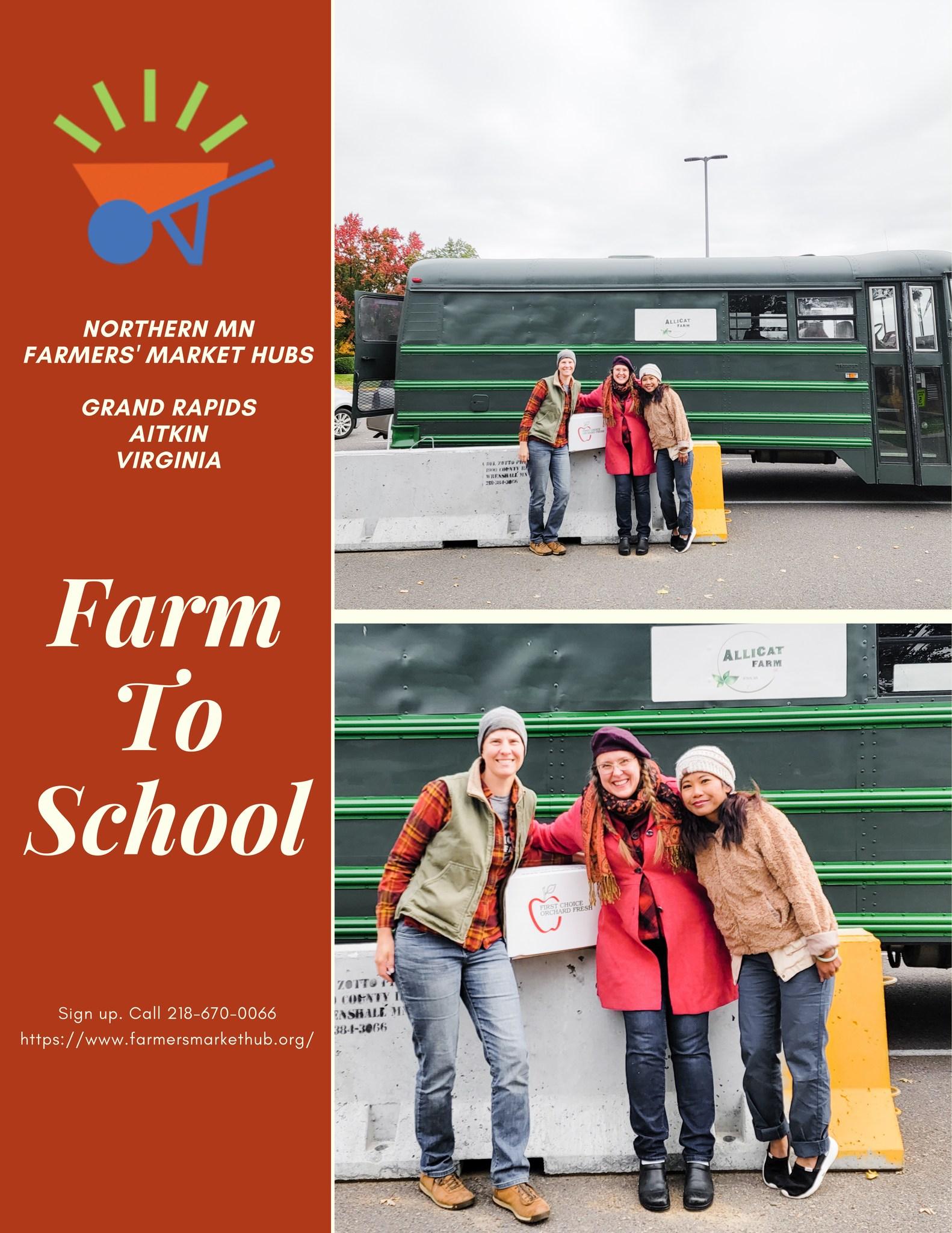
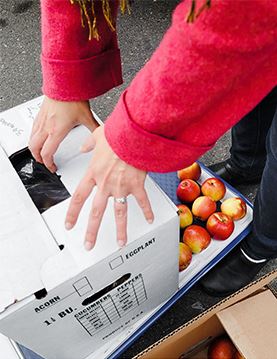
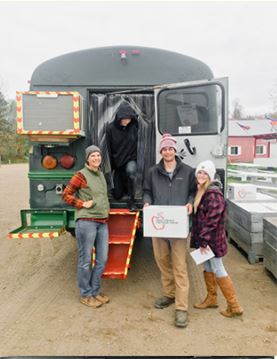
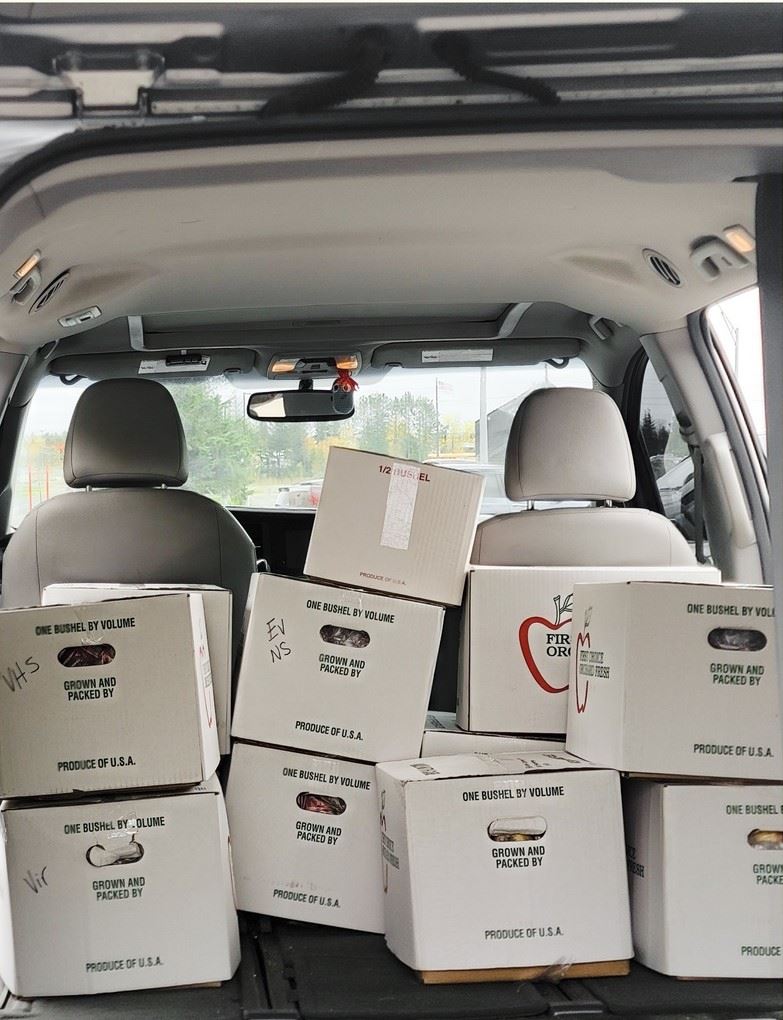
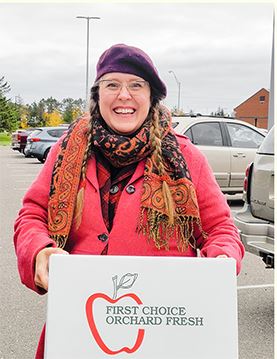
Here’s a great example of Hubs working together to make good things happen!
The Great Apple Caper in Northern Minnesota
5,300 apples to local Minnesota schools
Article by Kathleen Rykus
Community and helping out people in your area is a staple of Northern Minnesota culture. There’s something about the long winters and sparse population that encourages neighbor helping neighbor. Three women have been working together on the MN Farmers’ Market Food Hubs project for the past year, and when they got an opportunity to sell thousands of apples to schools in the Northern MN region, they got together and figured out how to make it happen. This was a process that took planning, relationship building, and follow up to accomplish, but is worth it in the long run in terms of benefits to local schools, local food producers, and the communities of upper northeast Minnesota.
Allison Rian, Kristine Jonas and Wililyn Dowell in front of AlliCat Farm’s bus. Rian and her family picked up the apples from Dave Gilbertson, owner of Gilby’s Orchard in Aitkin, MN. They loaded their farm’s bus with over 50 boxes of Honey Crisp and Sweet Tango apples, the equivalent of 5300 apples!
Rian met up with Dowell and Jonas in Hibbing by eleven o’clock, and the trio had to get all of the apples distributed by the end of the school day before staff went home. It was a tight schedule, and everyone had their part to contribute, all between dropping their own kids off at school, and tending to their own operations.
Dowell, Rian, and Jonas are all producers themselves, who know how challenging it is to grow and make products to bring to local farmers markets each week. But they are also proving that with the right technology, planning and teamwork, that the food hubs provide, production models can be scaled up to let small businesses experience big growth.
Working with the Minnesota FMFH project gave them the tools they needed to bring top quality products (MN’s own Sweet Tango and Honeycrisp apples) to their local schools. On this particular, they delivered over 5300 apples for the thirteen area schools:
Grand Rapids High School-1200 apple
Hill City Elementary School-400 apples
Nashwauk High School-140 apples
Keewatin Elementary School-220 apples
Hibbing Lincoln Elementary-1220 apples
Chisholm Vaughan Elementary-150 apples
Chisholm Elementary/HS-200 apples
Mt. Iron Buhl Elementary/HS-400 apples
Virginia High School-500 apples
Parkview Learning Center-300 apples
Eveleth North Star Elementary-350 apples
Laurentian Elementary- 300 apples
When Williyn Dowell began working as the Food Hub Manager for the Grand Rapids Farmers Market Food Hub, there were some smaller scale Farm to School efforts in the area. One school and one orchard would work together directly to provide apples to a school. Using this relationship building model, Dowell reached out first to Jayme Gabler, Itasca’s SHIP (Statewide Health Initiative Partnership) Coordinator, and both Dowell and Gabler met with Tanya Cunningham, Food Service Director for St. Louis County.
This year, with that relationship established, Dowell called her about the apple crunch. The Great Lakes Apple Crunch is a National Farm to School Month event that encourages schools and institutions across Minnesota, Wisconsin, Illinois, Indiana, Michigan, Iowa, and Ohio to purchase locally grown apples. Making connections and phone calls comes easily to Dowell, whose excellent sales skills and boundless energy have been a great fit for her role as Farmers’ Market Food Hub Manager. “That’s just what we as hub managers do. We promote hubs and healthy eating and local foods. Sometimes you just have to get on the phone and start talking to people to do that.”
Dowell picked up the phone and arranged a meeting with her SHIP Coordinator and started reaching out to schools. Then she got the school buyers on to Open Food Network online platform so that they could place orders online. She had them fill out the Buyers Survey that the food hubs project provided, which included information like contact info for the schools, as well as packaging and delivery requirements and all info the hub managers needed to be able to aggregate, distribute, and deliver all the apples in an efficient manner.
Dowell herself put on over 160 miles making deliveries, and of course, follow up was needed and a plan had to be arranged to get Gliby’s Orchard compensated quickly. Grand Rapids is now delivering 1200 apples/per week to Grand Rapids High School. Prices are negotiated and evaluated on an ongoing basis to create a win-win situation for the schools, the orchards, the food hubs, and the communities.
